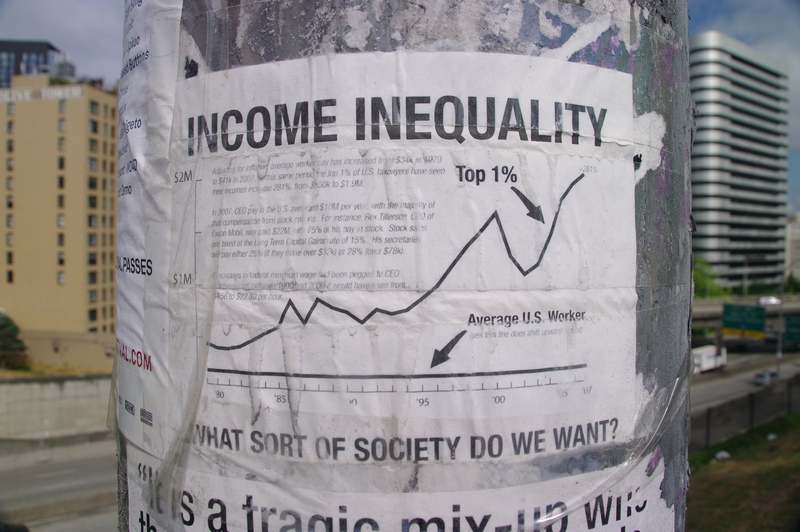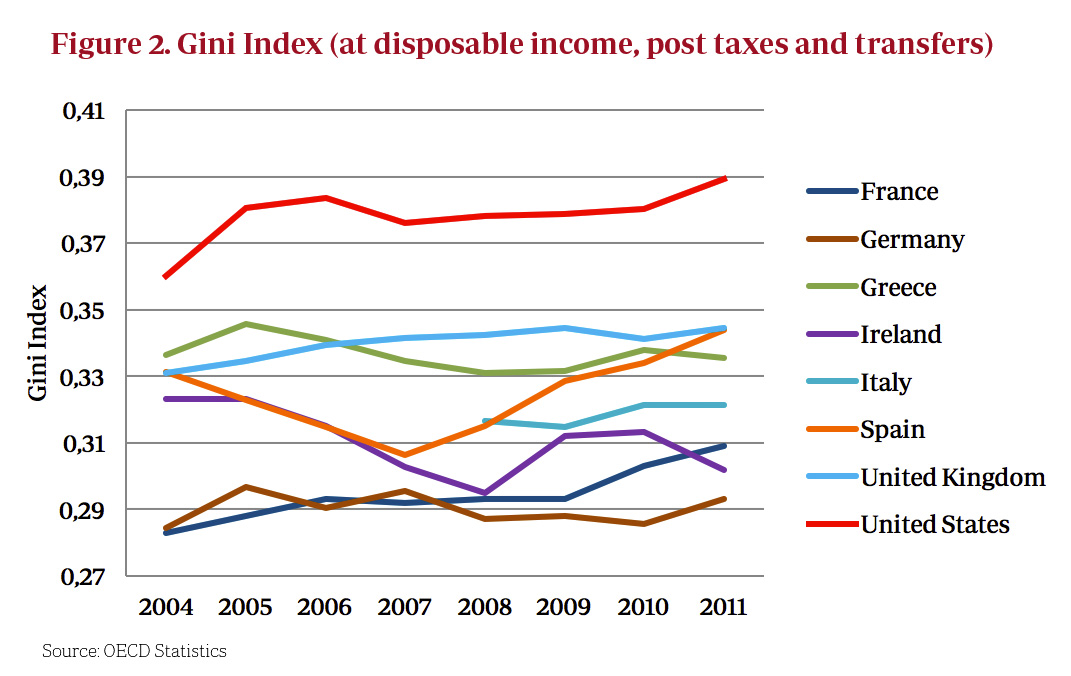Janet Yellen, chair of the Board of Governors of the US Federal Reserve, gave a speech in October 2014 in which she said that, “The past several decades have seen the most sustained rise in inequality since the 19th century after more than 40 years of narrowing inequality following the Great Depression. I think it is appropriate to ask whether this trend is compatible with the values rooted in our nation’s history, among them the high value Americans have traditionally placed on equality of opportunity .”
These remarks raise several questions:
- What are the facts on inequality?
- Why has inequality increased?
- Why does inequality matter?
- What can be done about it?
A lot of attention has focused on the fact that, particularly in the US, the richest 10 percent, and even more so the richest 1 percent, have increased their share of income while average salaries have stagnated.

According to OECD data, market income inequality has risen considerably since the crisis while disposable income inequality has increased much less due to welfare state taxes and transfers. And, the risk of poverty has shifted from the elderly to the young as disposable income has not fallen for the elderly.
Figure 1 below displays the changes in the Gini coefficient, an inequality indicator with a scale of 0 (no inequality) to 1 (maximum inequality), for OECD countries. Figure 2 shows the Gini index for disposable income and the wide differences between several countries.
The Causes of Inequality
The roots of inequality are complex. One explanation for the increased share of the top 1 percent is that managers influence boards and assign themselves high salaries, though this view is at odds with the high remuneration received by managers in firms closely controlled by the owner.
Furthermore, globalization and digital technology expand the market for talent, giving rise to the “superstar” phenomenon. The value of a top soccer player is much higher today thanks to digital global media, than it was in a world dominated by national TV, or going further back in time, in a world with no TV.
The entry of emerging economies, such as China and India, with a massive supply of unskilled workers, has impacted low-skilled workers in developed economies and pushed wages down. This affects the standard of living of middle classes in developed economies.
The evolution of family structure may play a role. At one extreme, there has been an increase in the numbers of couples in which both partners are high earners, resulting in children who are bound to be high earners, due to their advantages in family background and education. At the other extreme, the growing number of single-parent families has increased the risk of poverty.
Policy interventions may also have an impact on the evolution of inequality. In the US, relevant factors include the lowering of marginal tax rates during the Reagan era and efforts to provide credit to the middle classes during the Clinton era, in order to foster consumption with stagnating salaries.
Potential Consequences
Inequality may corrupt and endanger democracy. In the US in the late 19th century, large concentrations of power brought about by the formation of large firms was viewed as a menace. In fact, an early driver of antitrust regulation was to prevent these concentrations of power. The danger is a government captured by the interests of a segment of society.
Policy action
Policy should have clear goals and a social welfare function, focusing on the redistributive aims society wishes to accomplish. For example, do we want equality of opportunity or outcome?
The OECD recommends that countries promote employment and good quality jobs, greater participation of women in the workforce, improve education and skill acquisition over the working life, and optimally design the tax-benefit redistribution system. In her speech, Yellen emphasized four specific building blocks for improving equality of economic opportunity in the US: resources for children, affordable higher education, business ownership and inheritance. Food for thought.





I never really thought that serious inequality marked by high wages involving senior management and the development of communications, the argument is valid and I am aware that we are better than in the past, however this analysis is based in developed countries , in the nations of Latin influence other factors such as the high level of corruption in a state labor laws that go against the worker and multinationals taking a high percentage of production, leaving it to the state intervened , economic and labor costs up environmental .